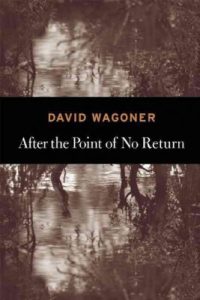Afterwords // David Wagoner at Seattle Arts & Lectures
 by Jennifer Crowder
by Jennifer Crowder
Poetry Northwest Contributor
David Wagoner appeared January 16, 2013 as part of SAL’s Poetry Series, reading from After the Point of No Return, (Copper Canyon Press, 2012). An audience of devotees nearly filled the Nordstrom Recital Hall and Wagoner, an icon among the northwest poetry community, did not disappoint.
The poems in this latest collection are reflective in a manner that only a half-century’s backward glance could provide. Although Wagoner ranges across familial relationships, generational transition, nature, what was done and what left undone, collectively, the poems have an atmospheric stillness and balance. They offer clear-eyed, unsentimental, but generous insights.
The most striking poems are those about the difficulties of aging. Wagoner writes of finding that his body “…disobeyed / its own commands to its own purpose,” and his tone in these poems blends regret, disbelief, levity, and transformation. In “Listening,” Wagoner considers hearing loss: “…vibrant / with the white noise and the equally beautiful / white silence of snow.” Most poems reveal a poet who, if not yet fully at home in his wardrobe of age, is beginning to at least take some of the garments off their hangers and try them on.
Regardless of age, Wagoner continues to expand his remarkable body of work—which includes 19 volumes of poetry, 10 novels, and assorted other pieces to date. However, Wagoner himself seems surprised by his continuing compulsion to write in the face of physical decline. Writing of his body in “A Brief History,”
“…the times
when it would sit and wait
without knowing what it was waiting for…
how it broke down, how,
but not why it made marks again
and again on pieces of paper.”
This is contrasted with times when Wagoner writes unflinchingly—almost longingly—of death, once referring to it as the “…chilling relief of lifelessness.”
Elizabeth Austen hosted a Q&A session following the reading, and wisely allowed the poet range freely. Wagoner expounded on his belief in the elements shared by poetry and music—rhythm, meter, timbre, and dynamics—providing insight into his polished delivery: carefully emphasize the poems’ musical elements and those, in turn, illuminate the nuances of language. He also mentioned that his father never remarked on his success as a poet, and barely acknowledged his chosen path as a writer. One can only speculate on the effects of such a background.
As most readers are aware, it’s no mean feat to write poems that are on one level accessible to a wide range of readers, yet also contain rich language and imagery, provide unexpected layers of meaning, and address issues common to human experience. Wagoner’s writing does all these things, while—like music—leaving an evocative echo in the listener’s mind and ear.
by contributing writer Jennifer Crowder
